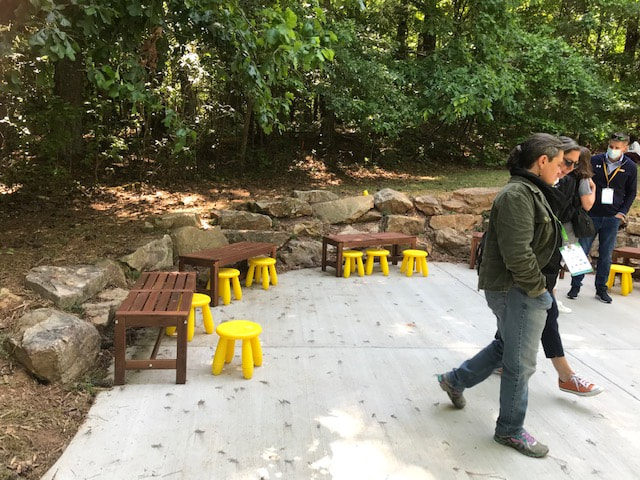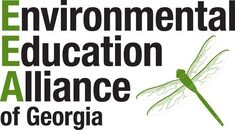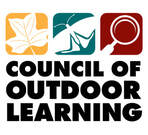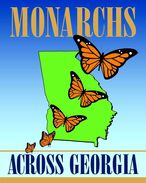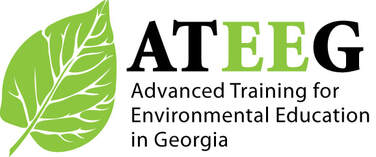Environmental Education Alliance of Georgia
- Our Story
- Our Team
- Our Events
-
Our Resources
- Wildlife Viewing
- Earth Month Activities
- Garden-based Learning
- EcoEngineering Challenges
- Community (Citizen) Science
- Phenomenon-Based Learning
- Problem-Based Learning
- Place-Based Learning
- Project-Based Learning
- Teaching about Climate Change
- Teaching about EJ
- Zero Waste Heroes
- SAGES Project
- Virtual EE Resources
- Environmental Clubs
- Evaluation and Assessment
-
Our Work
- Our News
- Our Impact
- JOIN or GIVE
- Member Portal
- Contact Us
- Outdoor Learning Store
- PassTick2023-4
- Annual Report
- New Page
- Past 2022 EEA Conference
- Past EEA Board 2021-22
- Past 2022 conferenceoverview
- Non-clickable Page
- New Page
- EEA Guest Blog
- Our Story
- Our Team
- Our Events
-
Our Resources
- Wildlife Viewing
- Earth Month Activities
- Garden-based Learning
- EcoEngineering Challenges
- Community (Citizen) Science
- Phenomenon-Based Learning
- Problem-Based Learning
- Place-Based Learning
- Project-Based Learning
- Teaching about Climate Change
- Teaching about EJ
- Zero Waste Heroes
- SAGES Project
- Virtual EE Resources
- Environmental Clubs
- Evaluation and Assessment
-
Our Work
- Our News
- Our Impact
- JOIN or GIVE
- Member Portal
- Contact Us
- Outdoor Learning Store
- PassTick2023-4
- Annual Report
- New Page
- Past 2022 EEA Conference
- Past EEA Board 2021-22
- Past 2022 conferenceoverview
- Non-clickable Page
- New Page
- EEA Guest Blog
COUNCIL OF OUTDOOR LEARNING
Sustaining Outdoor Learning
Planning First, to Make Your Outdoor Classroom Last
A study of 1,000 outdoor learning spaces in Georgia revealed that many continued to thrive for years despite changes in teachers, administrators, and volunteers, while others were abandoned, unused, or in poor repair. What made the difference?
Long-lasting outdoor learning spaces were fully-incorporated into the school culture and provided a context for real-world investigations related to the standards being taught. These spaces were used less for extra-curricular and after-school activities than for labs and investigations: essentially substituting hands-on outdoor learning experiences for lessons that otherwise would have been taught indoors. As one teacher said, "We've discovered that you can teach any subject outdoors!" Schools with a culture of outdoor learning tended to see their program as evolving and open to all who wanted to participate. For more insights into research on the sustainability of outdoor learning, check out the following report, and the tips and resources posted below it.
Long-lasting outdoor learning spaces were fully-incorporated into the school culture and provided a context for real-world investigations related to the standards being taught. These spaces were used less for extra-curricular and after-school activities than for labs and investigations: essentially substituting hands-on outdoor learning experiences for lessons that otherwise would have been taught indoors. As one teacher said, "We've discovered that you can teach any subject outdoors!" Schools with a culture of outdoor learning tended to see their program as evolving and open to all who wanted to participate. For more insights into research on the sustainability of outdoor learning, check out the following report, and the tips and resources posted below it.
Key Strategies for Sustaining Outdoor Learning Spaces and Programs
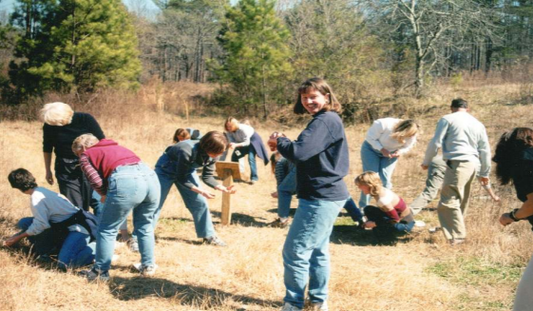
Build Capacity Before Infrastructure
Investing in teachers is more important than investing in facilities and infrastructure for outdoor learning. When teachers are comfortable being outside, confident about managing class behaviors and productivity, and accomplished at engaging students in science and engineering practices, outdoor learning will be successful regardless of whether any fancy facilities are available. Project WET, Project Wild, and Project Learning Tree are a few of the many courses that build teacher skills and provide curriculum materials for outdoor learning, organized by topic and by grade level.
Investing in teachers is more important than investing in facilities and infrastructure for outdoor learning. When teachers are comfortable being outside, confident about managing class behaviors and productivity, and accomplished at engaging students in science and engineering practices, outdoor learning will be successful regardless of whether any fancy facilities are available. Project WET, Project Wild, and Project Learning Tree are a few of the many courses that build teacher skills and provide curriculum materials for outdoor learning, organized by topic and by grade level.
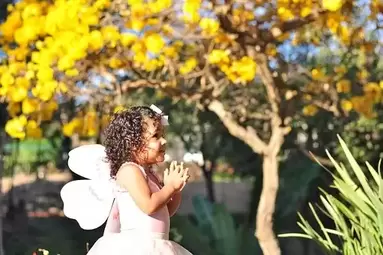
Keep Outdoor Learning Fresh and Relevant
Periodic surveys and asset-based site inventories can be used to identify valuable resources on campus, assess emerging needs, and update the Schoolyard Master Plan. Without a phased Master Plan that is periodically updated, schoolyard improvements are less likely to be implemented in priority order - or at all. Be prepared for Scout or volunteer groups that may approach the school, willing to contribute labor, by having created project scopes of work and supply lists that reflect the Master Plan.
Periodic surveys and asset-based site inventories can be used to identify valuable resources on campus, assess emerging needs, and update the Schoolyard Master Plan. Without a phased Master Plan that is periodically updated, schoolyard improvements are less likely to be implemented in priority order - or at all. Be prepared for Scout or volunteer groups that may approach the school, willing to contribute labor, by having created project scopes of work and supply lists that reflect the Master Plan.
|
Design Durable and Sustainable Spaces
When assessing school grounds to take note of areas that could work for outdoor learning, some factors to take into consideration are:
|
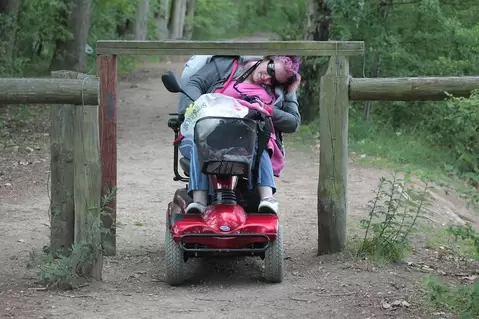
Attend to Access and Inclusivity
The Americans with Disabilities Act does not require that an entire school campus be accessible, but it does ensure that disabled students have access to the same opportunities as other children. The absence of a disabled child at the moment does not relieve that responsibility. The route to an outdoor learning area, the ground surfaces, and work surface or activity spaces must be accessible. Bark mulch, pea gravel, and crush run are not wheelchair-friendly (these surfaces also present problems for strollers, cargo wagons, and lawn mowers). Stabilized slate chips offer a permeable surface that packs flat and supports wheels. Trails may be natural, but edging should not constrict the width of a trail so that wheelchairs (or riding lawn mowers) are excluded.
The Americans with Disabilities Act does not require that an entire school campus be accessible, but it does ensure that disabled students have access to the same opportunities as other children. The absence of a disabled child at the moment does not relieve that responsibility. The route to an outdoor learning area, the ground surfaces, and work surface or activity spaces must be accessible. Bark mulch, pea gravel, and crush run are not wheelchair-friendly (these surfaces also present problems for strollers, cargo wagons, and lawn mowers). Stabilized slate chips offer a permeable surface that packs flat and supports wheels. Trails may be natural, but edging should not constrict the width of a trail so that wheelchairs (or riding lawn mowers) are excluded.
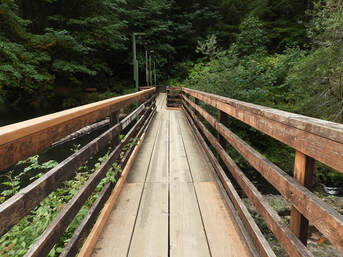
Use Eco-Friendly, Cost-Effective Materials
Salvaged, reclaimed, and recycled or reused building materials, or renewables such as bamboo and hay bales, can often provide inexpensive and eco-friendly options for improvements in outdoor learning spaces. Sturdiness and durability are key in a school setting where inappropriate uses must be anticipated (e.g., overloading structures, climbing trellises, sitting on tables). Kits for benches, bridges, and other improvements have two major advantages: 1) they make work easier and 2) assembly of a pre-fabricated kit that was designed and engineered for public use carries less liability than the constructing an original or custom design. The latte should always be approved by the district's facilities staff and may require an engineering seal.
Salvaged, reclaimed, and recycled or reused building materials, or renewables such as bamboo and hay bales, can often provide inexpensive and eco-friendly options for improvements in outdoor learning spaces. Sturdiness and durability are key in a school setting where inappropriate uses must be anticipated (e.g., overloading structures, climbing trellises, sitting on tables). Kits for benches, bridges, and other improvements have two major advantages: 1) they make work easier and 2) assembly of a pre-fabricated kit that was designed and engineered for public use carries less liability than the constructing an original or custom design. The latte should always be approved by the district's facilities staff and may require an engineering seal.
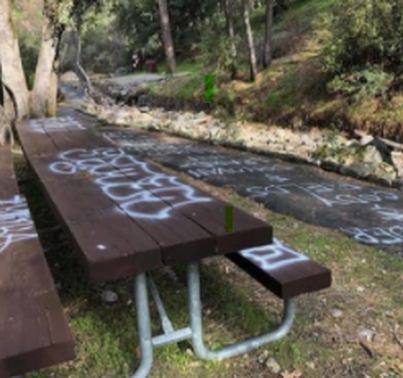
Deter Vandalism and Theft
If the area is prone to vandalism or theft, consider strategies that may reduce such incidences, including:
If the area is prone to vandalism or theft, consider strategies that may reduce such incidences, including:
- Student involvement in assembly, construction, or installation of improvements
- Design that resists vandalism, such as horizontal rather than vertical balusters, use of textured paint that resists graffiti and eases clean-up, extra-sturdy construction
- Quick clean-up, when needed, to avoid attracting more vandalism
- Locked tool storage; cable-locked tables and trail cameras; quickrete footings; etc.
- Engagement of community in use and "ownership" of the area after school hours
- Signage that credits local community members who helped create improvements
- Adopt-a-Spot programs for community-involved maintenance and monitoring
Create a Maintenance Plan
Outdoor learning areas require attention to ensure they are safe and in good repair. Keep things simple and low maintenance. Volunteers can help through an "Adopt-a-Spot" program. It's valuable to cultivate a good relationship with the grounds crews that bear the brunt of maintenance responsibilities. Identify and clarify the procedure for reporting hazards and requesting repairs. Create records that help school administrators or volunteers manage, maintain, and replace improvements, as needed, such as an annual maintenance plan for outdoor areas. Consider staging an annual outdoor learning event for students' families. An event such as Ford Elementary's Evening in the Gardens (see video below) not only builds support for outdoor learning, but also provides a yearly incentive to repair.
Outdoor learning areas require attention to ensure they are safe and in good repair. Keep things simple and low maintenance. Volunteers can help through an "Adopt-a-Spot" program. It's valuable to cultivate a good relationship with the grounds crews that bear the brunt of maintenance responsibilities. Identify and clarify the procedure for reporting hazards and requesting repairs. Create records that help school administrators or volunteers manage, maintain, and replace improvements, as needed, such as an annual maintenance plan for outdoor areas. Consider staging an annual outdoor learning event for students' families. An event such as Ford Elementary's Evening in the Gardens (see video below) not only builds support for outdoor learning, but also provides a yearly incentive to repair.
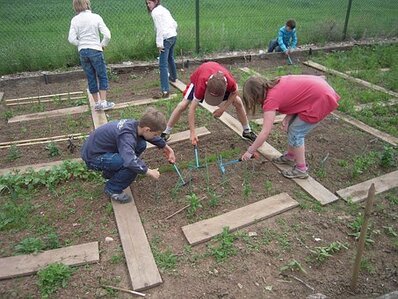
Strategize for Summer Break
Upon returning to school after the long summer break, the sight of overgrown school gardens and derelict outdoor learning stations can discourage even the most enthusiastic teacher or parent volunteer. Outdoor learning spaces that appear abandoned are also vulnerable to being dismantled by maintenance crews tasked with cleaning up school grounds before students return. Strategies for summer management of outdoor learning spaces include:
Upon returning to school after the long summer break, the sight of overgrown school gardens and derelict outdoor learning stations can discourage even the most enthusiastic teacher or parent volunteer. Outdoor learning spaces that appear abandoned are also vulnerable to being dismantled by maintenance crews tasked with cleaning up school grounds before students return. Strategies for summer management of outdoor learning spaces include:
- Organizing volunteers or coordinating with master gardeners to grow veggie gardens on school grounds for local families
- Converting raised beds to community gardens for the season
- Recruiting school families to "Adopt-a-Spot" through summer
- Sowing cover crops that restore soil and require no maintenance

Create a Record for the Future
Most schools experience some staff turnover every year. Before long, the history of an outdoor learning area can easily be lost. Documenting improvements, uses, and contact information can provide future faculty and families with access to missing information so they can continue to use or revitalize outdoor learning spaces. One effective strategy is to post photos, stories, and the rationale for outdoor learning on the school website. It is even more secure to create a profile at eeingeorgia.org, where photos, documents, maps, articles, maintenance guides, parts lists, and other information can be displayed or stored indefinitely. Here is an example from Ford Elementary School and a link to create a profile for your school.
Most schools experience some staff turnover every year. Before long, the history of an outdoor learning area can easily be lost. Documenting improvements, uses, and contact information can provide future faculty and families with access to missing information so they can continue to use or revitalize outdoor learning spaces. One effective strategy is to post photos, stories, and the rationale for outdoor learning on the school website. It is even more secure to create a profile at eeingeorgia.org, where photos, documents, maps, articles, maintenance guides, parts lists, and other information can be displayed or stored indefinitely. Here is an example from Ford Elementary School and a link to create a profile for your school.
Make it Easy for Volunteers: Create an Adopt a Spot Program
If you have never heard the anguished wailing of students who just discovered that another class pulled out their dormant perennials and replaced them with annuals, consider yourself lucky. It takes coordination, communication, and a lot of grace to share outdoor learning spaces with others — especially if those spaces are in short supply. A shared calendar can be useful for reserving limited spaces. So can a map and field guide that show locations of class projects and identifies native or landscaped plants vs. non-native species that may crowd out indigenous plants and fail to support local pollinators and wildlife. Below is an example of a document that informs interested people of the natural assets and improvements on a school campus.
If you have never heard the anguished wailing of students who just discovered that another class pulled out their dormant perennials and replaced them with annuals, consider yourself lucky. It takes coordination, communication, and a lot of grace to share outdoor learning spaces with others — especially if those spaces are in short supply. A shared calendar can be useful for reserving limited spaces. So can a map and field guide that show locations of class projects and identifies native or landscaped plants vs. non-native species that may crowd out indigenous plants and fail to support local pollinators and wildlife. Below is an example of a document that informs interested people of the natural assets and improvements on a school campus.
Your browser does not support viewing this document. Click here to download the document.
DOWNLOAD Frey Elementary Adopt a Spot Handbook below:
| freyfrogsadopt-a-spothandbookpdfversion.pdf | |
| File Size: | 4242 kb |
| File Type: | |
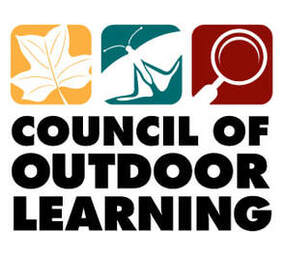
The Council of Outdoor Learning (CoOL) is an EEA initiative that focuses on the design, development, use, and sustainability of outdoor learning environments on school campuses. CoOL provides tips and techniques for those who want to create outdoor classrooms or learning stations, hosts an annual symposium to share resources and strategies for teaching outdoors, curates a collection of outdoor learning activities that are integrated with state standards, and provides professional learning workshops, resources and webinars for teachers and non-formal educators.
|
Environmental Education Alliance, Inc.
P.O. Box 801066 | Acworth, GA 30101 EEA does not does not discriminate on the basis of race, color, national origin, sex, age, or disability in its program , activities, or employment. For more information on EEA's non-discrimination commitment click here . Grievance officer may be contacted at [email protected] |
Proudly powered by Weebly
|
